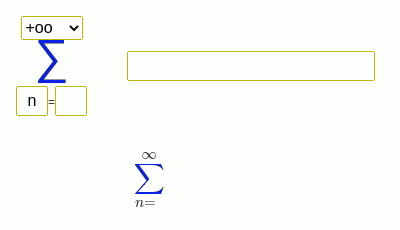Sum of series n(x^n)
The solution
You have entered
[src]
oo ___ \ ` \ n / n*x /__, n = 1
$$\sum_{n=1}^{\infty} n x^{n}$$
Sum(n*x^n, (n, 1, oo))
The radius of convergence of the power series
Given number:
$$n x^{n}$$
It is a series of species
$$a_{n} \left(c x - x_{0}\right)^{d n}$$
- power series.
The radius of convergence of a power series can be calculated by the formula:
$$R^{d} = \frac{x_{0} + \lim_{n \to \infty} \left|{\frac{a_{n}}{a_{n + 1}}}\right|}{c}$$
In this case
$$a_{n} = n$$
and
$$x_{0} = 0$$
,
$$d = 1$$
,
$$c = 1$$
then
$$R = \lim_{n \to \infty}\left(\frac{n}{n + 1}\right)$$
Let's take the limit
we find
$$R = 1$$
$$n x^{n}$$
It is a series of species
$$a_{n} \left(c x - x_{0}\right)^{d n}$$
- power series.
The radius of convergence of a power series can be calculated by the formula:
$$R^{d} = \frac{x_{0} + \lim_{n \to \infty} \left|{\frac{a_{n}}{a_{n + 1}}}\right|}{c}$$
In this case
$$a_{n} = n$$
and
$$x_{0} = 0$$
,
$$d = 1$$
,
$$c = 1$$
then
$$R = \lim_{n \to \infty}\left(\frac{n}{n + 1}\right)$$
Let's take the limit
we find
$$R = 1$$
The answer
[src]
/ x | -------- for |x| < 1 | 2 | (1 - x) | | oo < ___ | \ ` | \ n | / n*x otherwise | /__, |n = 1 \
$$\begin{cases} \frac{x}{\left(1 - x\right)^{2}} & \text{for}\: \left|{x}\right| < 1 \\\sum_{n=1}^{\infty} n x^{n} & \text{otherwise} \end{cases}$$
Piecewise((x/(1 - x)^2, |x| < 1), (Sum(n*x^n, (n, 1, oo)), True))

Examples of finding the sum of a series
- The Sum of the Power Series
x^n/n
(x-1)^n
- Factorial
1/2^(n!)
n^2/n!
x^n/n!
k!/(n!*(n+k)!)
- Flint Hills Series
csc(n)^2/n^3
- Basel problem
1/n^2
1/n^4
1/n^6
- Harmonic series
1/n
- Grandi's series
(-1)^n
- Alternating series
(-1)^(n + 1)/n
(n + 2)*(-1)^(n - 1)
(3*n - 1)/(-5)^n
(-1)^(n - 1)*n/(6*n - 5)
- Newton–Mercator series
(-1)^(n + 1)/n*x^n
- Exam the series for convergence
(3*n - 1)/(-5)^n

 (2^n+3^n)/6^n
(2^n+3^n)/6^n